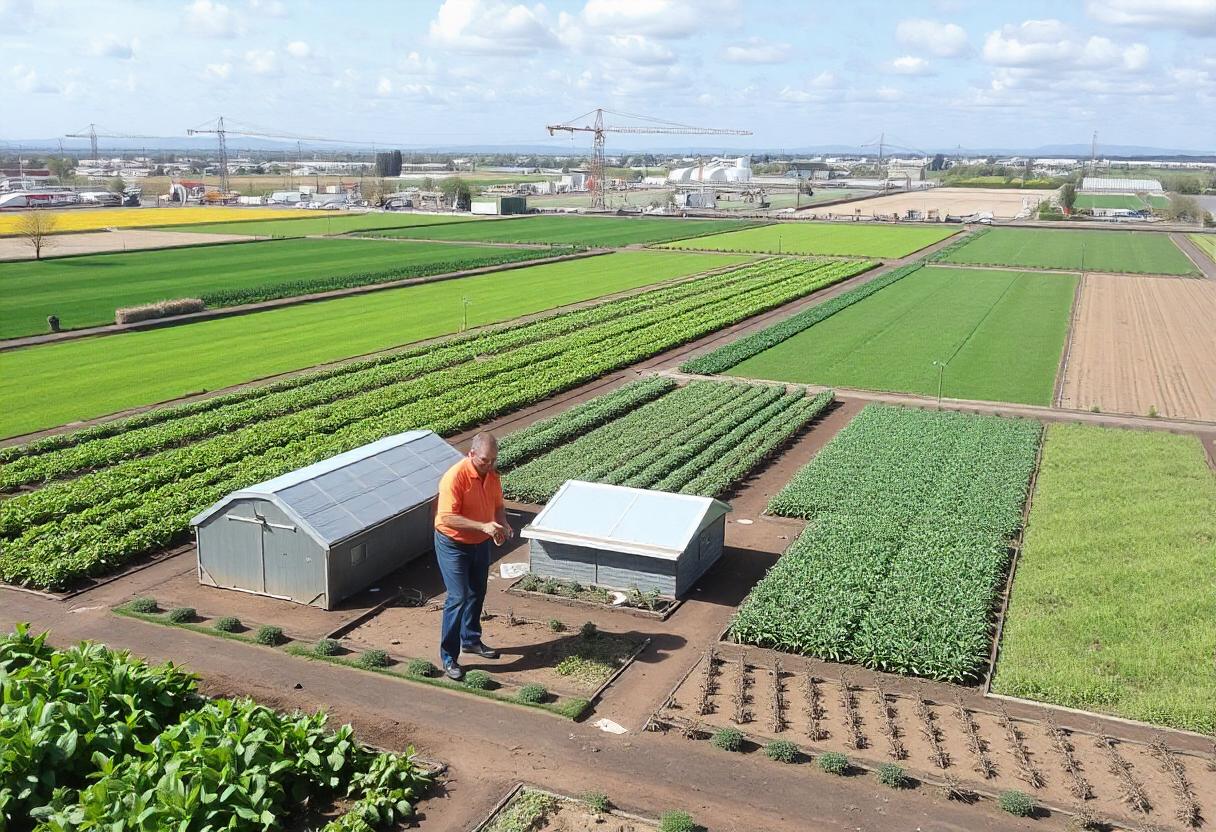
Industrial agriculture, also known as intensive farming or factory farming, refers to the modern practice of producing large quantities of crops and livestock by utilizing advanced technology, machinery, synthetic fertilizers, and pesticides. This method of agriculture has become the dominant system of food production worldwide, particularly in developed countries, and has profoundly shaped how food is cultivated, processed, and consumed.
Origins and Development of Industrial Agriculture
The roots of industrial agriculture can be traced back to the Industrial Revolution in the 18th and 19th centuries. This period marked a shift from traditional, small-scale farming practices to mechanized and more efficient methods. With the advent of new technologies, such as the steam engine, and later, gasoline-powered tractors, farmers were able to cultivate larger areas of land with less manual labor. The introduction of synthetic fertilizers and chemical pesticides in the early 20th century further boosted agricultural productivity, leading to higher crop yields and the ability to sustain larger populations.
In the post-World War II era, industrial agriculture expanded rapidly, driven by the Green Revolution. This movement introduced high-yield crop varieties, improved irrigation techniques, and the widespread use of chemical inputs to combat global hunger. These innovations significantly increased food production in countries like Mexico, India, and the Philippines, transforming the global food system.
Key Features of Industrial Agriculture
- Monoculture: One of the hallmark features of industrial agriculture is the practice of monoculture, where large areas of land are dedicated to the cultivation of a single crop. This approach allows for specialized machinery and inputs to be used more efficiently. However, it can also lead to soil depletion, loss of biodiversity, and increased vulnerability to pests and diseases.
- Mechanization: The use of machinery in industrial agriculture has greatly reduced the need for human labor. Tractors, combines, and other specialized equipment enable farmers to plow, plant, and harvest crops at a much larger scale. While mechanization improves efficiency, it can also lead to soil compaction and erosion if not managed properly.
- Synthetic Inputs: Industrial farming relies heavily on synthetic fertilizers, pesticides, herbicides, and fungicides to enhance crop production and control pests. While these inputs have helped increase yields, they can have negative environmental impacts, such as water contamination, soil degradation, and the loss of beneficial insects.
- Livestock Production: In addition to crop cultivation, industrial agriculture includes large-scale livestock farming. Factory farms, or concentrated animal feeding operations (CAFOs), house thousands of animals in confined spaces to maximize meat, dairy, and egg production. These operations often use antibiotics and growth hormones to promote rapid growth, raising concerns about animal welfare, antibiotic resistance, and environmental pollution from waste runoff.
- Global Supply Chains: Industrial agriculture operates within a global supply chain, where crops and livestock are produced, processed, and distributed across vast distances. This interconnected system enables food to be transported to regions that may not have the capacity to produce it locally. However, it also contributes to greenhouse gas emissions and can lead to supply chain disruptions due to factors like extreme weather or political instability.
Environmental Impact of Industrial Agriculture
While industrial agriculture has contributed to significant increases in food production, it has also raised concerns about its environmental impact. The intensive use of land, water, and chemical inputs has resulted in a range of ecological challenges, including:
- Soil Degradation: Continuous monoculture farming, combined with heavy machinery and chemical inputs, can lead to soil degradation. Over time, soils become less fertile, requiring more synthetic fertilizers to maintain yields. This cycle can reduce soil health and increase the risk of erosion.
- Water Usage: Industrial agriculture is a major consumer of freshwater resources, particularly for irrigation. In many regions, over-extraction of groundwater for farming has led to water scarcity, affecting both ecosystems and human populations. Additionally, runoff from industrial farms, containing fertilizers and pesticides, can contaminate water bodies, leading to eutrophication and harmful algal blooms.
- Biodiversity Loss: The focus on monoculture and the use of pesticides in industrial agriculture has contributed to a significant loss of biodiversity. Pollinators, such as bees and butterflies, are particularly vulnerable to the effects of chemical pesticides, which can disrupt ecosystems and reduce crop yields that depend on pollination.
- Greenhouse Gas Emissions: Industrial farming is a significant contributor to greenhouse gas emissions, particularly through livestock production. Methane emissions from ruminant animals, such as cows, and nitrous oxide emissions from synthetic fertilizers, contribute to climate change.
Economic and Social Implications
Industrial agriculture has had profound economic and social effects, both positive and negative. On the one hand, it has contributed to economic growth by creating large agribusinesses and providing food at lower costs. In many countries, industrial farming has led to higher incomes for farmers who adopt these methods, along with increased food availability for consumers.
On the other hand, the concentration of agricultural production in the hands of a few large corporations has displaced small-scale farmers and reduced rural employment opportunities. Many traditional farming communities have struggled to compete with the economies of scale achieved by industrial farms, leading to rural depopulation in some areas. Additionally, concerns about labor conditions on industrial farms, particularly for migrant workers, have been raised, as these operations often rely on low-wage labor to remain profitable.
Industrial agriculture has revolutionized food production but continues to raise debates around sustainability and ethical practices in the agricultural sector.